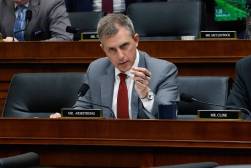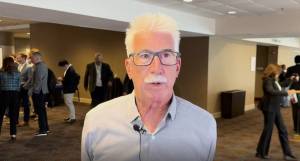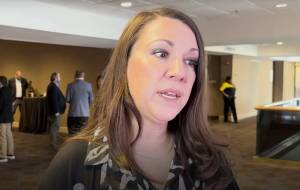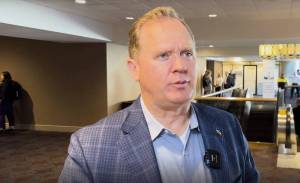Outgoing Virginia CIO reflects on state’s accomplishments

Samuel Nixon keeps a folder on his desk from his time as a state legislator. That folder contains all of the plans for what would become the Virginia Information Technologies Agency — an agency that he has led for almost five years as chief information officer.
“It’s been an interesting week,” Nixon told StateScoop in an exclusive interview just days before he leaves his office for the last time this Friday. “It’s been a good five years, and I will greatly miss all of the folks here. It’s just time to see some new opportunities, so that’s what I’m doing.”
Nixon’s next move takes him in a somewhat different direction, as the new chief administrative officer at the Virginia State Corporation Commission, a regulatory agency in state government that keeps tabs on limited liability partnerships and corporations within the state.
From his time as a state legislator, where he worked to establish VITA, Nixon said that he and his team accomplished everything they had set out to do at the inception of the agency.
“It was darn hard along the way,” Nixon said. “[What we did] was very, very disruptive, but there’s no question in my mind that the citizens of Virginia are better off because we pursued this very difficult and challenging task.”
According to Nixon, building out a consolidated shared service environment, bringing the agency to a better financial footing and moving the agency to the new, more digital age of IT, are among the greatest accomplishments during his time as CIO.
Ninety-six percent of the state’s IT infrastructure has been consolidated to a new shared services environment, Nixon said. While some agencies still haven’t started using shared services to consolidate their IT infrastructure, he said even bringing most of the state on board with shared services was an accomplishment.
“The vision of having a consolidated shared service environment that is reliable and secure, measured and accountable — well, that has been accomplished,” Nixon said. “That was an enormous feat.”
But that measured level of success was not so prevalent when Nixon took the post in 2010. Shortly after the initial portion of the recession, the agency was left in a rough financial spot.
“The agency was hemorrhaging cash,” Nixon said. “The financial model was broken when I arrived. [We made tough] decisions to put us all on the path of financial stability that enabled us to start paying and do all the things we needed to do.”
Now, the agency is on a stable financial footing and has been able to transform and develop with IT as it moved from the server-and-mainframe era to the digital era.
“I feel like I have been the CIO as IT has been going through this transformational period from where we think about IT in terms of brick and mortar, and now think of IT in a more virtual state,” Nixon said. “A lot of that has occurred in just this short period of time.”
Going forward, Nixon said the main challenge facing state CIOs starts and ends with security.
“How do we secure state systems and citizen data from unauthorized access as we go through this transformation?” Nixon said. “A lot of people brush that aside, but that is not an insignificant challenge. It’s enormous. The enemies of the states are constantly looking for ways to do us harm economically, militarily and on an individual level.”
The next Virginia CIO has yet to be appointed, but Nixon said part of the agenda for his successor will be dealing with what the state will do after its outsourcing contract with Northrop Grumman Corp. ends in 2019.
“Right now, we’re in the ninth year of a 13-year outsourcing contract with Northrop Grumman,” Nixon said. “This outsourcing arrangement was the right thing to do, but it was back in the brick-and-mortar era, but now we need to look at what the right IT sourcing model for Virginia will be toward the end of this partnership.”
For Nixon, the future of state government IT will be dealing with the “untethered ubiquitous high-speed bandwidth” that recent Internet developments provide. CIOs will also need to find a way to keep up with the demand of the public’s desire for innovative technology.
“We are starting to see more examples of wearable technology coming into the equation where we have to take a traditional IT infrastructure and figuring out how we support location and position-aware devices,” Nixon said. “We want to push more and more citizen interaction to be conducted online. We’ve had a lot of progress in that area, but there is so much left to be done.”
But there’s a huge difference between having the ideas and actually executing a project, Nixon said.
“All these things take money, take resources, take the people planning,” Nixon said. “But how do you capitalize the efficiencies ahead of being able to realize the monetary benefits from the money that you are spending. That’s really hard to do in government.”






